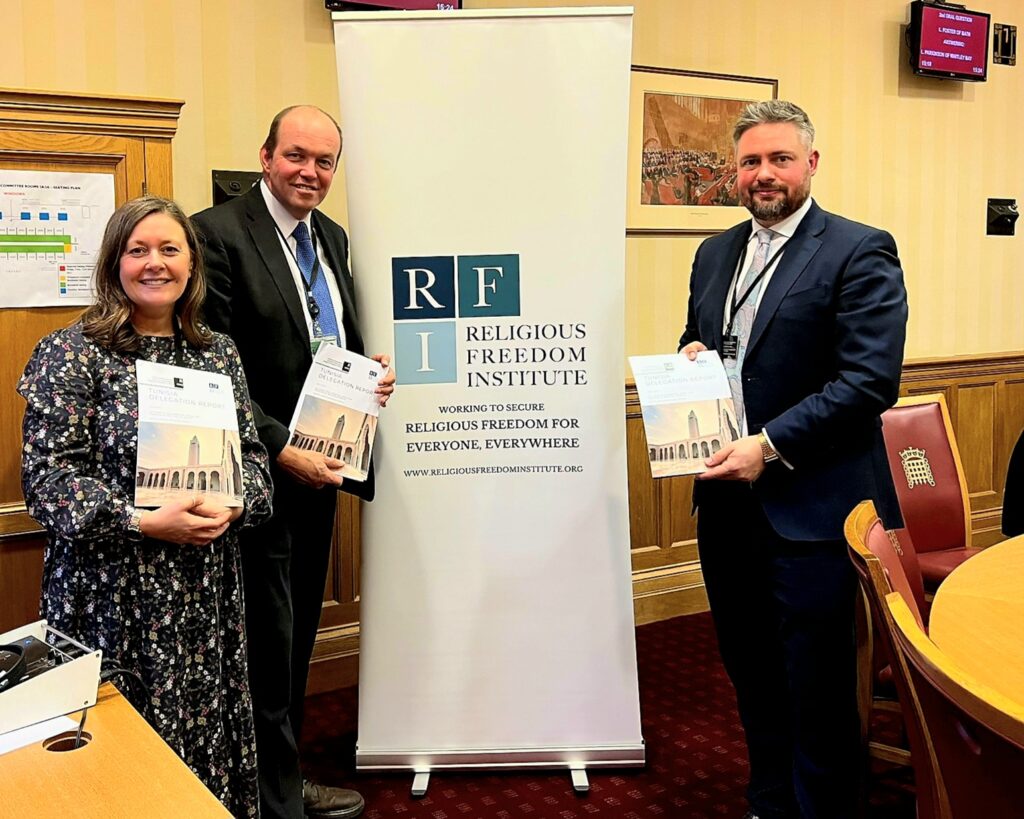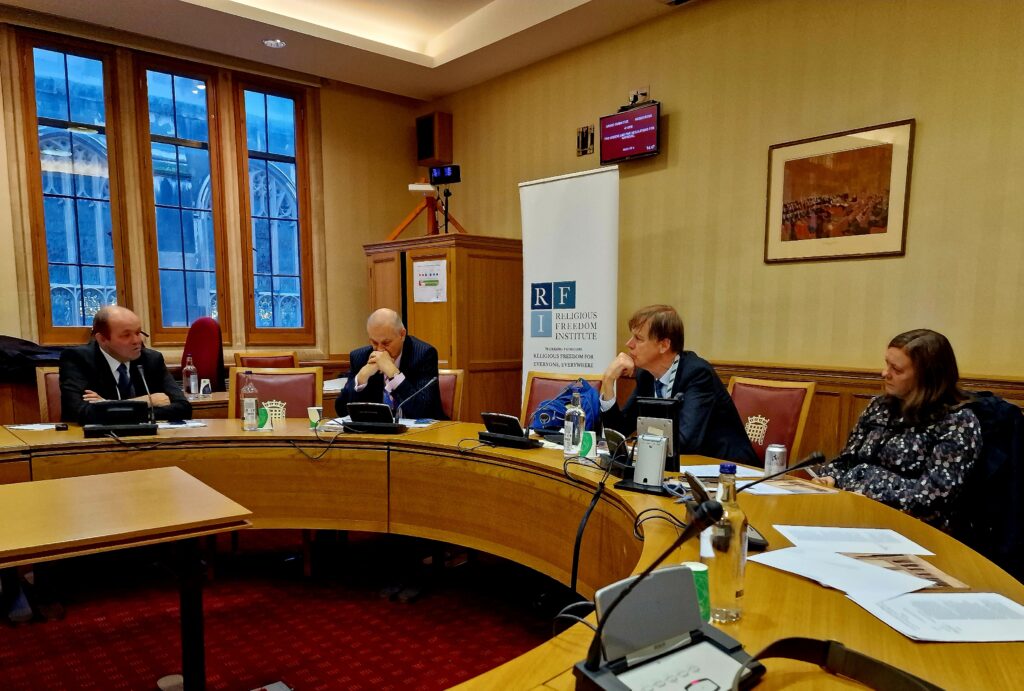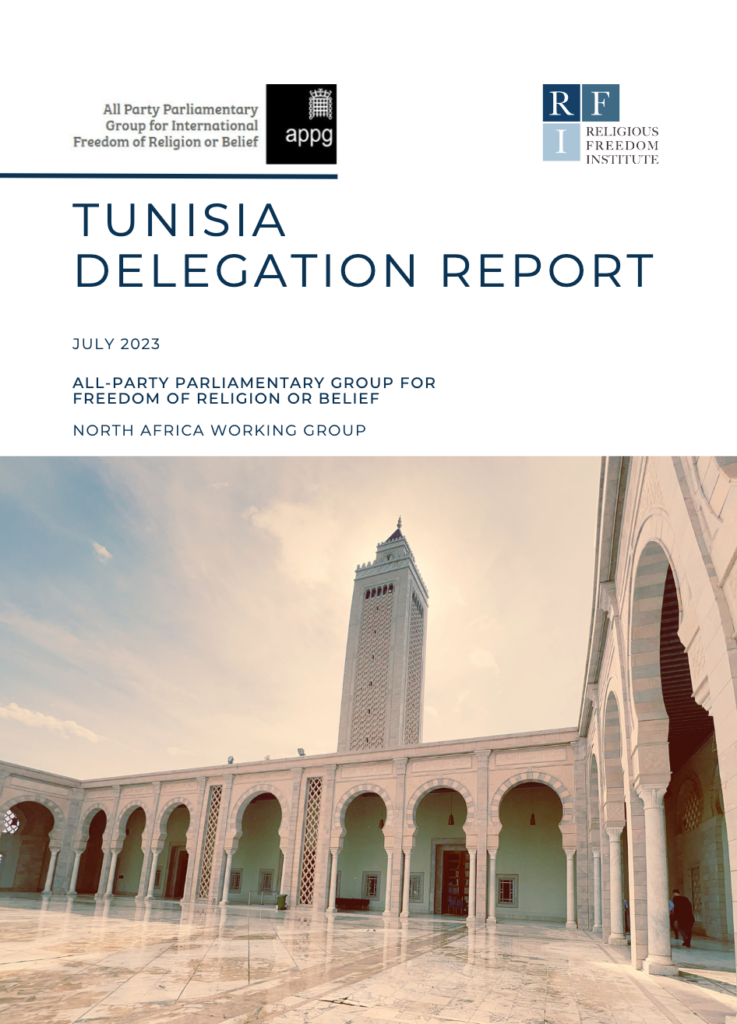On December 13, 2023, in the British Houses of Parliament, the Religious Freedom Institute (RFI), working with the All Party Parliamentary Group for Freedom of Religion or Belief (APPG FoRB), launched a joint report on the UK Parliamentary delegation visit to Tunisia. The report had been embargoed since the summer on account of sensitivities around ongoing dialogue between the parliamentary group, RFI, and both the British and Tunisian governments.
At the launch, the delegates — Rt Hon Sir Stephen Timms MP, Rt Hon Lord Stewart Jackson of Peterborough, David Burrowes (the UK Prime Minister’s Deputy Special Envoy for Freedom of Religion or Belief), and Miles Windsor (RFI Middle East and North Africa Team) — discussed the religious freedom landscape in Tunisia and the report’s recommendations. APPG FoRB Director, Julie Jones, introduced the briefing on behalf of Jim Shannon MP (Chairman of the APPG FoRB) and offered thoughts and insights about how the APPG FoRB could continue its strategic engagement in relation to Tunisia as well as neighboring North African nations.
The delegation met with representatives of minority religious communities such as the Baha’is, Jews, Evangelical Christians, and Catholics. They also met with representatives of the Sunni majority.
The religious freedom picture in Tunisia is mixed. The civil society space is reasonably strong in Tunisia, though it is being eroded due to the increasingly concerning political climate. The delegates met with a religious freedom organization called Attalaki, which promotes dialogue and cooperation among religious leaders to advance peaceful coexistence and respect.
Denial of legal recognition for a range of religious groups and denominations remains a problem, which produces in them a sense of precariousness and restricts their freedom. For example, practical challenges relating to burial sites is a profound burden, as many religious communities do not have sites in which they can inter their dead.
The delegates also met with some senior figures in the Jewish community. A terrorist attack on their annual festival a few weeks prior to the delegation’s visit was a clear indication of the kind of pressure they’re under. They highlighted other examples of anti-Semitism and related impunity for offenders.

The report presents recommendations for the British Government, the Tunisian Government, and the APPG FoRB. Among other points, the report recommends that British officials in London and Tunis should develop a better understanding and recognition of religious freedom not as a fringe humanitarian issue, but as foundational to the stability, security, prosperity, and wider flourishing of Tunisia. To this end, the report further recommended that the UK Government should consider additional opportunities for capacity building for their officials on the subject of religious freedom and related matters.
The report recommended that the Tunisian Government should formally recognize and register a broader selection of religions and denominations, providing them with the full and equal benefits this recognition entails. Recommendations also encouraged the Tunisian Government to work to safeguard the religious diversity and peaceful coexistence of Tunisian society through laws and policies that defend against prejudice and intolerance. Among other suggestions, the delegation recommended that more should be done to preserve the precious cultural and religious heritage sites of Tunisia and develop the potential for religious and cultural tourism.
The delegation recommended that APPG FoRB continue to work strategically to improve conditions not just in the worst offending countries, but also in those countries that might have less problematic records but which could benefit from taking steps to preserve and enhance existing religious freedom condtions. In such cases there’s an improved prospect for influence and safeguarding religious freedom, potentially with an impact more broadly in the international community.
The delegates each commented that the visit to Tunisia had been highly informative and valuable, and they expressed gratitude to RFI. The delegates also committed to continue efforts, with RFI and the APPG FoRB secretariat, to pursue meaningful reforms with the Tunisian Parliament’s Rights and Freedoms Committee, ongoing engagement with the UK Foreign, Commonwealth and Development Office. They also indicated a strong desire to expand the group’s focus to include Algeria.

THE RFI BLOG

Myths of Religious Nationalism in America and Abroad

France’s Olympic Hijab Ban Violates International Law And Exacerbates Tensions

RFI Briefs USCIRF on Lessons from 25 Years of U.S. Designating Religious Freedom Violators

Thought Police: Protecting the People from Prayer

A Religious “Delaware”: Establishing a State Haven for Religious Corporations
CORNERSTONE FORUM

Challenges to Religious Freedom in Iraq and the Critical Need for Action

Public Bioethics & the Failure of Expressive Individualism

Religious Liberty in American Higher Education

Scotland’s Kate Forbes and the March of Secularism


